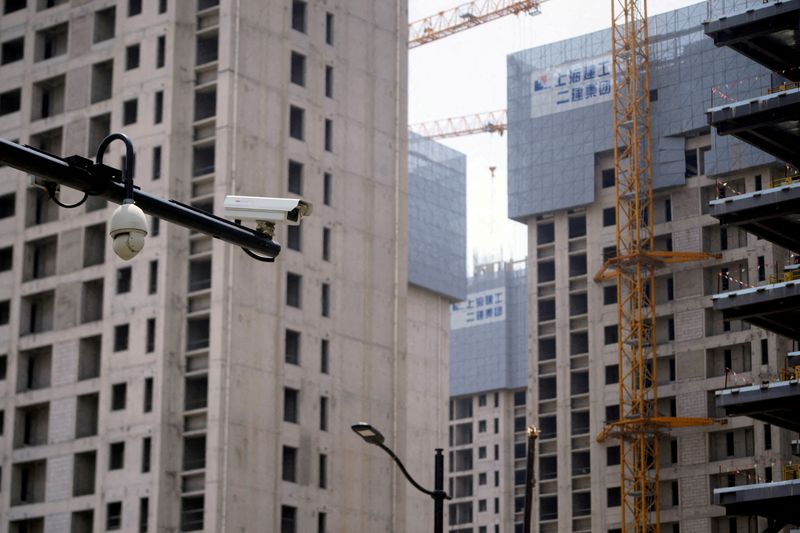Analysis-Chinese property developers on tenterhooks ahead of Communist Party Congress
2022.10.14 02:24
[ad_1]

© Reuters. FILE PHOTO: Surveillance cameras are seen near residential buildings under construction in Shanghai, China July 20, 2022. REUTERS/Aly Song/
By Clare Jim
HONG KONG (Reuters) – Chinese real estate developers are delaying their debt restructuring moves until after the upcoming Communist Party Congress, hoping the crucial gathering offers clues on how Beijing plans to stabilise the embattled sector.
What emerges at the meeting could help determine how the developers, who have missed payments or even defaulted on their offshore bonds worth tens of billions of dollars, pace any asset sales, extract or offer concessions to creditors, or even put themselves up for liquidation.
While there is no consensus in the property industry on what specific sector measures, if any, are expected from the party congress – or in its immediate aftermath – and how far-reaching they could be, developers are nevertheless sitting tight.
“The terms for the restructuring would be very different if the market recovers (post-congress meeting) and we are able to start selling and get cashflow rolling again,” said a senior executive at a developer based in China’s southern province of Guangdong, explaining the rationale for deferring the company’s debt restructuring talks.
The developer, which is in the process of restructuring after missing payments on some of its offshore debt, said in such a scenario bondholders would have more confidence in long-term repayments and the company could minimise disposal of core assets.
If, however, Beijing does not introduce game-changing policies, developers could then take measures such as enforcing steep haircuts on bondholders or even liquidate, developers and restructuring advisers said.
Some of the major developers in the process of restructuring their debt include China Evergrande Group, whose liquidity crunch last year was a turning point in the country’s real estate crisis, Sunac China Holdings, Shimao Group Holdings and Kaisa Group Holdings.
Smaller peers, which have done bond exchanges to extend the maturities of their debt, are also considering restructuring, the developers told Reuters.
Graphic: China’s real estate debt
China’s twice-a-decade party congress kicks off on Oct. 16, during which President Xi Jinping is poised to secure a precedent-breaking third leadership term as general secretary. The makeup of China’s economic leadership is set for its biggest overhaul in a decade.
The property sector is crucial to China’s political and economic stability, with real estate accounting for around 40% of household assets, according to analysts, and making up around a quarter of the country’s gross domestic product, the largest among all sectors.
But after a government crackdown in 2020 on developers’ debt-fuelled expansion, the sector has become a major headache for Beijing over the past year.
Evergrande, with its $300 billion total debt and a default on its offshore debt last year, has cast an unwelcome light on Chinese developers’ $5 trillion debt, rattling global markets and sparking rare protests.
NO ‘HEADLINES’
An executive at another property company, which had previously planned to negotiate restructuring terms with offshore bondholders in the run-up to the party congress, said authorities told the developer to hold off on discussions to prevent any shock to the real estate market.
“To put it simply, the government doesn’t want any headlines,” said the executive, who declined to be identified due to the sensitivity of the issue.
Echoing that apprehension ahead of the party congress, some fund managers and brokers have been told to avoid big share sales, two sources told Reuters.
The debt crisis in the property sector has led to dwindling investment from developers and homebuyers. Now, many analysts expect China’s GDP to grow at roughly 3% this year, the slowest pace since 1976, excluding the 2.2% expansion during the initial COVID hit in 2020, as the sector drags on the economy.
China has already rolled out a plethora of measures to bolster housing demand and affordability, but home prices and sales have continued to contract. New home prices fell for the third straight month in September, a private survey showed.
“They have already tried so many relaxing measures and none of them worked,” said a senior executive at a Shanghai-based developer. “It is a confidence issue; people don’t want to spend money to buy houses even if you lower the down-payment ratio or cut the mortgage rates.”
Graphic: China’s real estate growth
Another real estate executive told Reuters the government was unlikely to reverse its goal to deleverage the sector, and cautioned that if no drastic support measures were announced at the party congress, disappointment could lead to a market rout.
Betty Wang, senior China economist at ANZ, said with Xi’s principle of “houses are for living, not for speculation”, she did not expect any material changes to property regulations.
With the emphasis on local governments implementing “city-specific” measures without a coordinated nationwide effort, varying degrees of policy relaxation in different cities could squeeze liquidity and demand for other cities and lessen the overall policy impact, she told Reuters.
“The lack of specifics from the central government makes local governments, developers and homebuyers stay cautious,” Wang said. “Developers will not increase their investment while homebuyers don’t know whether it is the bottom yet.”
For some stakeholders, the stalling of the debt restructuring ahead of the party congress is frustrating.
One bondholder told Reuters the developer it has a holding in kept delaying its restructuring timetable, initially from Chinese New Year in February, to a parliament meeting in March, and now to the party congress next week.
“Every time they said there would be policy changes and we’d give you something after that. This kind of thing never ends, there’s always an excuse,” said the person, who declined to be named due to the sensitivity of the issue.
“They tell you a timetable but I don’t think any of them is realistic; the companies have no clue either.”
[ad_2]
Source link








